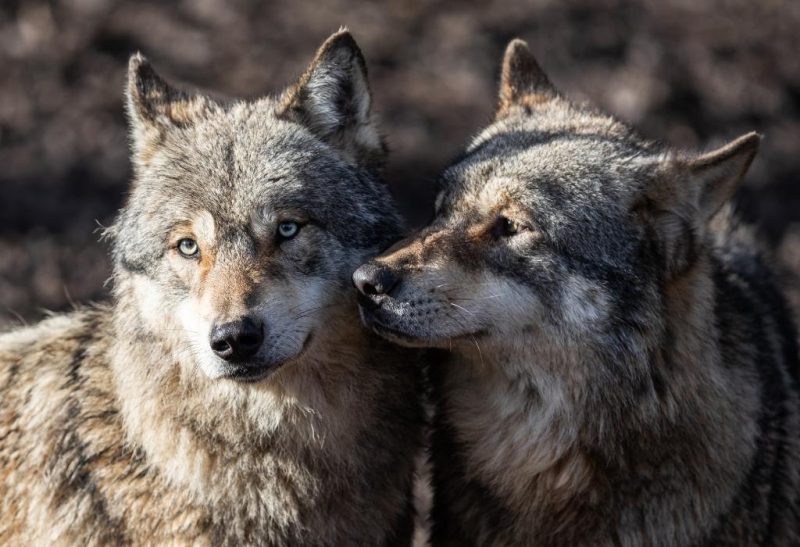Amazingly, fidelity and loyalty are practiced by some animals. For example, beavers, gibbons, seahorses, and birds like albatross have lifetime partners. They live together to breed and produce healthy offspring.
You may have heard that wolves are loyal, and they mate for life too. Is it real or just a myth?
Do wolves mate for life? If partner passed away due to premature death, the surviving wolf will find a new mate. Alphas are devoted and loving to their mates, and these behaviors are similar to human affection. After they mate with their partners, the attachment between them continues.
The loyalty and affection shared by the wolves are astounding.
Table of Contents
Do Wolves Have Lifelong Partners?
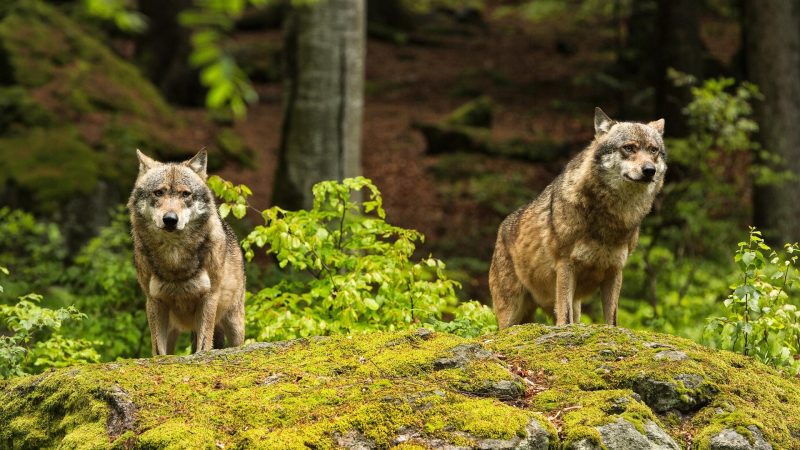
Wolves have lifelong partners as they are only separated by death. But some chose to be a ‘lone wolf’ which means being in solitude. Despite the need for companionship, social requirements, and the ability for hunting a larger game, some male and female wolves live alone.
Those who prefer to live alone leave their packs around the age of one to four years old. This act helps prevent inbreeding and the increase of genetic diversity. However, lone wolves must find ways to survive in times of adversity.
When Do Wolves Mate?
The breeding season of wolves begins in late January and ends in March. The sex hormones fill the air when copulation occurs. During this period, the alpha pair separates from the pack to focus on rearing their pups. It takes 63 days for the female to deliver the pups.
Does Only the Alpha Pair Mate for Life?
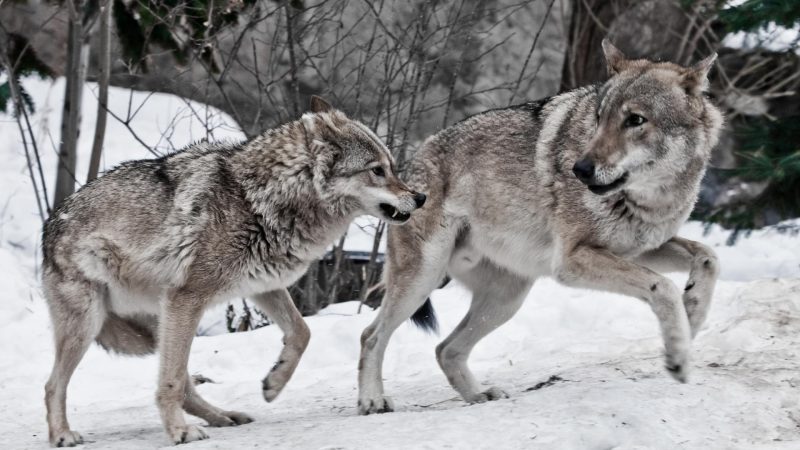
Since wolves live in a familial unit called ‘wolf pack,’ there’s an emotional bond between the members. Therefore, females also pair with the alpha for life. The mate of an Alpha male is called Alpha female or Luna wolf.
Both of them are dedicated not only to raising their pups but to instilling unity within the pack. In the social hierarchy of wolves, one of the responsibilities of the female is to maintain harmony within the pack.
Why Do Wolves Mate for Life?
The main reason why wolves mate for life is parental care which is similar to what humans do. A good relationship among parents supports the healthy growth and mental stability of the growing children. This is also applicable to the pack of wolves.
Based on instincts, the father is the provider and protector of the whole pack. A mother cooperates by establishing an ideal family through love and affection. A good parental relationship is a foundation of properly raising offspring for survival.
This doesn’t only apply with wolves but with other animals as well. Mating for life is how wolves deal with the demand of raising a healthy litter.
What Happens if a Wolf Mate Dies?
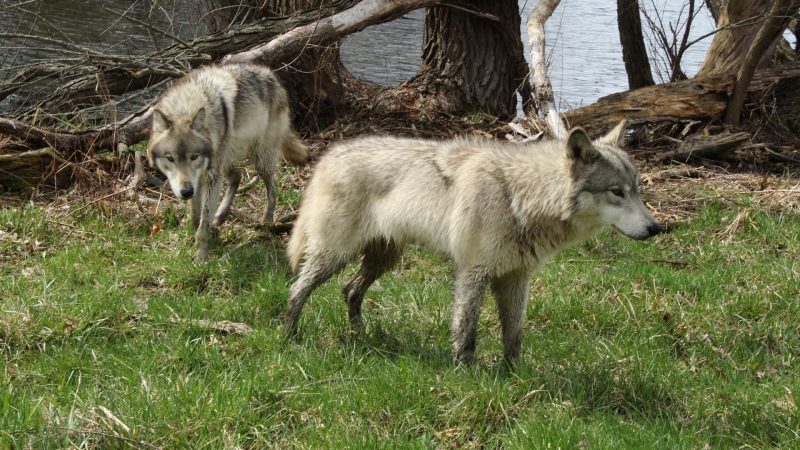
If a wolf mate dies, the surviving partner will look for another suitable partner. It’s not only done by the alpha male but the female too. They both think that it’s necessary to have a partner to help maintain the pack’s hierarchy and stability.
In the pack of wolves, incest can happen because parents and offspring or siblings sometimes mate. Normally, a mature offspring will likely fill the vacancy of an alpha male or female. However, this is a rare situation mentioned in the book entitled ‘Behavioral Ecology’ by Deborah E. Smith.
How Does a Female Wolf Protect Her Mate?
An observation among wolf packs in Yellowstone from 1995 to 2015 can answer this question. Most of them are fine to look after pups even though they’re not their own to add more members to their pack. It implies that a bigger pack means more power.
In connection with this, some males are allowed to join a well-established pack. But this welcoming act never happened with a female wolf. Female wolves don’t contribute to the success of the pack for winning over a conflict or assailants. The accomplishment is credited to the oldest male wolf.
Female wolves are aggressive most of the time, but the level drops when they’re pregnant. However, they don’t apply it in protecting their mates since their primary role is to take care of the pups.
There’s a photo of three wolves that caught a lot of attention. Some people presume that the female wolf is shielding the throat of the male wolf while facing an assailant. It’s just mere speculation. The real story about the photo is disclosed by Lori Schmidt, a Center’s Wolf Curator for three years. Here it is:
The younger male wolf is under the throat of his older brother (the leader of the pack) because it’s a sign of dependence and fear. Therefore, a female wolf doesn’t have the instinct to protect her mate, but an Alpha male does it instead since it’s one of his main roles.
Do Wolves Cheat on Their Mate?
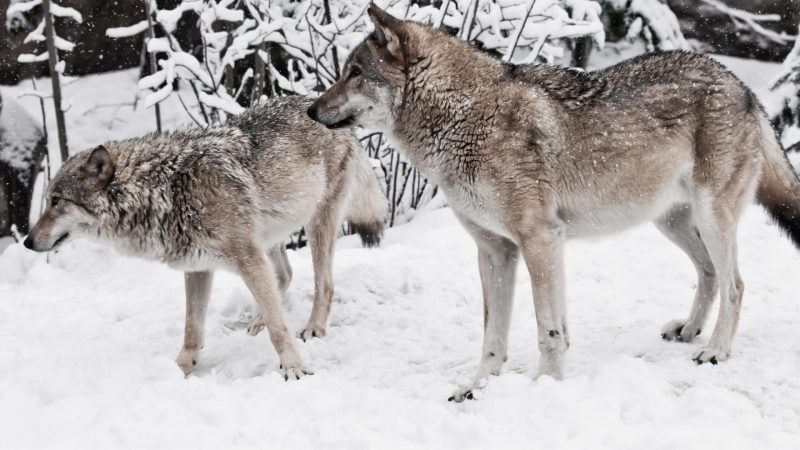
Though wolves are recognized as monogamous, the alpha male can cheat on his mate. It happens for a good reason, like maintaining lineage or preserving the large size of the pack.
For instance, it will come to a point that a partner becomes incapable of producing healthy offspring. Cheating is not only done by the alpha males, but alpha females can also commit it.
Are Wolves Loyal to Their Mates?
Wolves are loyal to their mates because both of them remain as the alpha pair of the pack. Although cheating happens, it’s for a valid reason.
They will only look for another if a partner dies, so a replacement is necessary. Moreover, they don’t do it when their partner is still alive.
Frequently Asked Questions
Can a Wolf and a Fox Mate?
Due to the different genetic structures of wolves and foxes, they do not and cannot mate. They possess distinct chromosomes even though they both come from Canid families.
Wolves have 78 chromosomes, while foxes have only 38. Hence, they can’t mate because of their sizes too.
Wolves are bigger than foxes, and they tend to attack the latter when they’re in the same territory. Thus, they don’t establish an amicable relationship to start with.
Can a Wolf Mate with a Coyote?
Wolf can mate with a coyote. A study among wolves and coyotes from Canada and the United States was conducted. It started with insemination and backcrossing then the mating of F1 offspring took place.
The process was successful since it gave life to wolves and coyote hybrids. These hybrids are fertile and can produce more pups.
Can a Wolf and a Dog Mate?
A wolf and a dog can mate and produce healthy and fertile offspring. The pup is 50% dog and 50% wolf. But, the percentage will be difficult to calculate when backcrossing occurs.
How Do Wolves Build Their Relationships?
Aside from this lasting relationship as a couple, they build a wolfpack which is an extended family for these animals. A dominant male and dominant female lead it. In a pack, only the alpha male breeds and it stops other members from doing so by harassing them.
Thus, only four to six pups are added to the litter every year, but sometimes, there’s only one additional member.
Since subordinates can’t have the privilege of the alpha male, they leave the pack when they’re mature. This is a chance for them to create their pack and lead it. Then, the alpha male finds a partner that will help him start a pack and expand it.
Interestingly, the pair of wolves bond by nuzzling and sleeping together before mating. The mating will start once the female wolf unleashes sex hormones during copulation.
If it’s done at the incorrect time, the female will snarl at the male. Once they start mating, they will continue to live together until misfortune happens, like premature death.
Summary
Wolves cannot mate for life because replacing a partner can take place. When a partner is taken away by premature death, the surviving wolf will need a replacement. Cheating is also possible, but it happens for a reason like continuing the lineage or preserving the ideal size of the pack. These things are done for the sake of the wolf pack.
List of Sources
Gray Wolf Biology Questions and Answers. (2006). University of Nebraska – Lincoln.
Premo, A. (2020). The Connection of The Pack. Oregon State University.
Smith, D., et al. (1997). Is incest common in gray wolf packs? Behavioral Ecology.
Mech, L. D., et al. (2017). Studies of wolf x coyote hybridization via artificial insemination. PLoS One.
